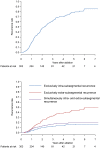Frequency, risk factors and survival associated with an intrasubsegmental recurrence after radiofrequency ablation for hepatocellular carcinoma
- PMID: 23593129
- PMCID: PMC3625228
- DOI: 10.1371/journal.pone.0059040
Frequency, risk factors and survival associated with an intrasubsegmental recurrence after radiofrequency ablation for hepatocellular carcinoma
Abstract
Background: In the treatment of hepatocellular carcinoma (HCC), hepatic resection has the advantage over radiofrequency ablation (RFA) in terms of systematic removal of a hepatic segment.
Methods: We enrolled 303 consecutive patients of a single naïve HCC that had been treated by RFA at The University of Tokyo Hospital from 1999 to 2004. Recurrence was categorized as either intra- or extra-subsegmental as according to the Couinaud's segment of the original nodule. To assess the relationship between the subsegments of the original and recurrent nodules, we calculated the kappa coefficient. We assessed the risk factors for intra- and extra-subsegmental recurrence independently using univariate and multivariate Cox proportional hazard regression. We also assessed the impact of the mode of recurrence on the survival outcome.
Results: During the follow-up period, 201 patients in our cohort showed tumor recurrence distributed in a total of 340 subsegments. Recurrence was categorized as exclusively intra-subsegmental, exclusively extra-subsegmental, and simultaneously intra- and extra-subsegmental in 40 (20%), 110 (55%), and 51 (25%) patients, respectively. The kappa coefficient was measured at 0.135 (95% CI, 0.079-0.190; P<0.001). Multivariate analysis revealed that of the tumor size, AFP value and platelet count were all risk factors for both intra- and extra-subsegmental recurrence. Of the patients in whom recurrent HCC was found to be exclusively intra-subsegmental, extra-subsegmental, and simultaneously intra- and extra-subsegmental, 37 (92.5%), 99 (90.8%) and 42 (82.3%), respectively, were treated using RFA. The survival outcomes after recurrence were similar between patients with an exclusively intra- or extra-subsegmental recurrence.
Conclusions: The effectiveness of systematic subsegmentectomy may be limited in the patients with both HCC and chronic liver disease who frequently undergo multi-focal tumor recurrence.
Conflict of interest statement
Figures




Similar articles
-
Recurrence-free survival after radiofrequency ablation of hepatocellular carcinoma. A registry report of the impact of risk factors on outcome.Jpn J Clin Oncol. 2007 Sep;37(9):658-72. doi: 10.1093/jjco/hym086. Epub 2007 Aug 31. Jpn J Clin Oncol. 2007. PMID: 17766723
-
Risk factors for the recurrence of hepatocellular carcinoma after radiofrequency ablation of hepatocellular carcinoma in patients with hepatitis C.World J Gastroenterol. 2005 Apr 14;11(14):2174-8. doi: 10.3748/wjg.v11.i14.2174. World J Gastroenterol. 2005. PMID: 15810088 Free PMC article.
-
Risk factors for the local recurrence of hepatocellular carcinoma after a single session of percutaneous radiofrequency ablation.J Gastroenterol. 2003;38(10):977-81. doi: 10.1007/s00535-003-1181-0. J Gastroenterol. 2003. PMID: 14614605
-
Liver resection versus radiofrequency ablation for recurrent hepatocellular carcinoma: a systematic review and meta-analysis.Int J Hyperthermia. 2021;38(1):875-886. doi: 10.1080/02656736.2021.1933218. Int J Hyperthermia. 2021. PMID: 34078221
-
Can Liver Ultrasound Elastography Predict the Risk of Hepatocellular Carcinoma Recurrence After Radiofrequency Ablation? A Systematic Review and Meta-Analysis.Ultraschall Med. 2023 Jun;44(3):e139-e147. doi: 10.1055/a-1657-8825. Epub 2021 Nov 10. Ultraschall Med. 2023. PMID: 34758491 English.
Cited by
-
Long-term survival after surveillance and treatment in patients with chronic viral hepatitis and hepatocellular carcinoma.Hepatol Commun. 2017 Jun 21;1(7):595-608. doi: 10.1002/hep4.1047. eCollection 2017 Sep. Hepatol Commun. 2017. PMID: 29404481 Free PMC article.
-
Postoperative aspartate aminotransferase to lymphocyte ratio index change is an independent predictor of survival in patients with small hepatocellular carcinoma.Medicine (Baltimore). 2017 Nov;96(45):e8540. doi: 10.1097/MD.0000000000008540. Medicine (Baltimore). 2017. PMID: 29137062 Free PMC article.
-
Predicting recurrence following radiofrequency percutaneous ablation for hepatocellular carcinoma.Hepat Oncol. 2014 Oct;1(4):395-408. doi: 10.2217/hep.14.22. Epub 2014 Dec 11. Hepat Oncol. 2014. PMID: 30190975 Free PMC article. Review.
-
Evaluation of sorafenib treatment and hepatic arterial infusion chemotherapy for advanced hepatocellular carcinoma: a comparative study using the propensity score matching method.Cancer Med. 2015 Aug;4(8):1214-23. doi: 10.1002/cam4.476. Epub 2015 Jun 4. Cancer Med. 2015. PMID: 26044168 Free PMC article.
-
Postoperative Low Absolute Lymphocyte Counts may Predict Poor Outcomes of Hepatocellular Carcinoma After Liver Resection.Chin Med J (Engl). 2016 Mar 5;129(5):536-41. doi: 10.4103/0366-6999.176982. Chin Med J (Engl). 2016. PMID: 26904987 Free PMC article.
References
-
- Bruix J, Sherman M (2005) Management of hepatocellular carcinoma. Hepatology 42: 1208–1236. - PubMed
-
- Ikai I, Arii S, Kojiro M, Ichida T, Makuuchi M, et al. (2004) Reevaluation of prognostic factors for survival after liver resection in patients with hepatocellular carcinoma in a Japanese nationwide survey. Cancer 101: 796–802. - PubMed
-
- Makuuchi M, Hasegawa H, Yamazaki S (1985) Ultrasonically guided subsegmentectomy. Surg Gynecol Obstet 161: 346–350. - PubMed
Publication types
MeSH terms
LinkOut - more resources
Full Text Sources
Other Literature Sources
Medical

